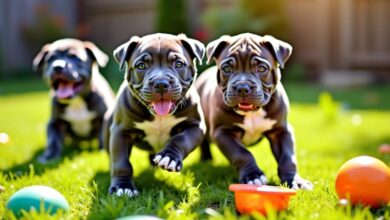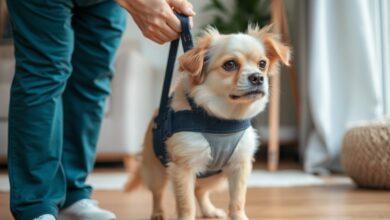Basset Hound Feeding Chart – 6 Nutritional Tips
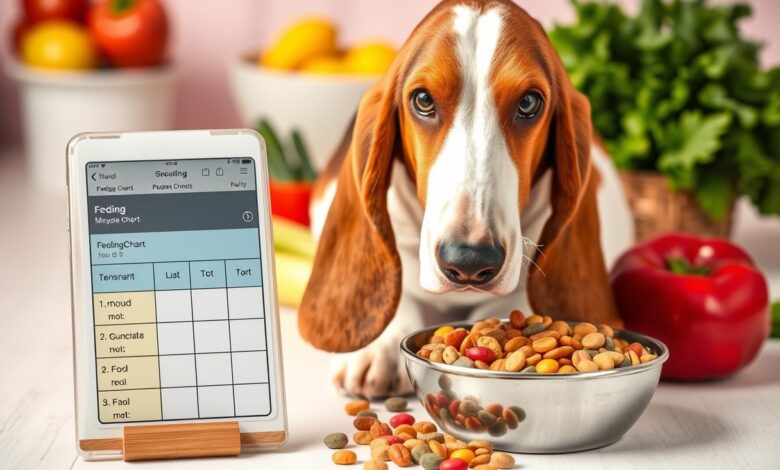
There’s no doubt that your Basset Hound deserves the best when it comes to nutrition. Understanding the right portion sizes and food types is crucial for your dog’s health and well-being. In this blog post, you will find a comprehensive feeding chart tailored specifically for Basset Hounds, along with six important nutritional tips to help you keep your furry friend healthy and happy. By following these guidelines, you can ensure your Basset Hound maintains a healthy weight while enjoying their meals.
Importance of a Balanced Diet
A balanced diet is important for your Basset Hound’s overall health and well-being. Providing the right nutrients ensures that your dog maintains a healthy weight, supports growth, and strengthens their immune system. A well-planned diet can also minimize the risk of chronic health issues, helping your Basset Hound to lead a long and happy life. Prioritizing balanced nutrition will empower you to provide the best care for your furry companion.
Key Nutritional Requirements
Importance of a well-rounded diet for your Basset Hound cannot be overstated. Your dog requires a proper mix of proteins, carbohydrates, fats, vitamins, and minerals to thrive. Proteins support muscle development while healthy fats contribute to energy levels and coat health. Fiber is also crucial for digestive health, and understanding these key nutritional elements will help you create a balanced feeding routine for your pooch.
Potential Health Risks
An imbalanced diet can lead to various health risks for your Basset Hound. Conditions like obesity, diabetes, and joint problems are common among dogs who consume excessive calories or lack important nutrients. You must recognize that poor nutrition can exacerbate breed-specific issues, making it vital to monitor your dog’s diet closely to ensure they are getting the nutrients they need.
Another significant concern is that if your Basset Hound is fed an inadequate diet, they may develop serious complications such as malnutrition or nutritional deficiencies. These conditions can result in weakened bones, poor coat quality, and a decreased immune response, making your dog more susceptible to infections and diseases. Furthermore, an excess of certain nutrients can lead to organ failure or toxicities. Ultimately, understanding the potential health risks associated with an imbalanced diet is crucial for ensuring your Basset Hound enjoys a healthy and vibrant life.
Basset Hound Feeding Guidelines
It is important to follow Basset Hound feeding guidelines to ensure your furry friend stays healthy and happy. These guidelines consist of understanding their specific nutritional needs, establishing a consistent feeding routine, and providing balanced meals that cater to their unique body structure. Adhering to these guidelines will help prevent obesity and related health issues, keeping your Basset Hound in great shape throughout their life.
Recommended Daily Caloric Intake
Any Basset Hound requires a specific caloric intake based on various factors such as age, weight, and activity level. On average, adult Basset Hounds typically need around 750 to 1,200 calories per day. It’s important to monitor your dog’s weight and make adjustments to their calories accordingly to prevent obesity. Always consult with your veterinarian for personalized recommendations that cater specifically to your Basset Hound’s individual needs.
Portion Control Techniques
Hound owners should adopt effective portion control techniques to manage their Basset Hound’s diet successfully. This involves measuring your dog’s food using a standard cup or kitchen scale, feeding them at regular intervals, and avoiding free-feeding, which can lead to overeating. By implementing portion control, you can help maintain a healthy weight and reduce the risk of obesity-related health issues.
Recommended portion control techniques include dividing your Basset Hound’s daily food intake into two or three meals to optimize digestion and prevent bloating. Always use a measuring cup or digital scale to ensure accurate portions, as it is easy to unintentionally overfeed. Additionally, consider using interactive feeding toys that dispense food while your dog plays, encouraging mental stimulation and slower eating. Monitoring your dog’s weight regularly allows you to make necessary adjustments, ensuring they stay at a healthy weight and live a long, active life.
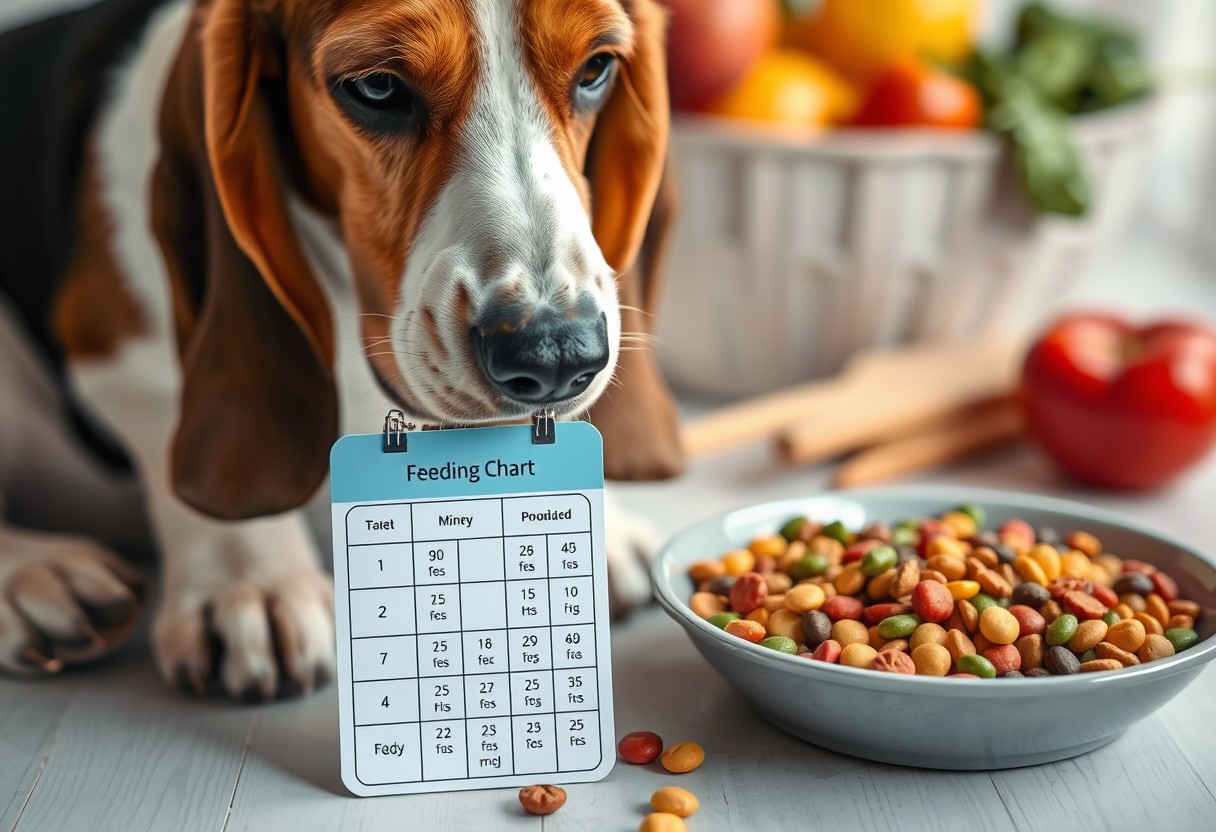
Choosing the Right Dog Food
Assuming you want the best for your Basset Hound, selecting the right dog food is crucial for their overall health and well-being. Consider food that meets their specific nutritional needs, particularly their age, weight, and activity level. It’s advisable to consult with your veterinarian to ensure you’re making informed choices tailored to your dog’s individual requirements.
Types of Dog Food Available
With various types of dog food on the market, it’s imperative to understand your options. The following table breaks down the most common types:
| Dry Kibble | Convenient and cost-effective. |
| Canned/Wet Food | Higher moisture and palatability. |
| Raw Diet | Promotes natural eating habits. |
| Homemade Meals | Allows full control over ingredients. |
| Limited Ingredient Diets | Best for dogs with food sensitivities. |
Perceiving your dog’s unique needs will help guide your decision on the food type most suitable for them.
What to Look for in Ingredients
Food quality matters significantly when choosing dog food. You should prioritize ingredients that promote a healthy diet for your Basset Hound. Look for high-quality proteins as the first ingredient, such as chicken, beef, or fish, which are crucial for muscle development and overall health.
To ensure you are providing the best nutrition for your dog, focus on food that lists whole meats or meat meals as the primary source of protein. Avoid foods with fillers like corn or soy, which offer little nutritional value. Additionally, watch out for artificial preservatives, colors, and flavors that can be detrimental to your dog’s health. Opt for brands that include healthy fats for coat health, and whole grains for balanced energy. Always read labels carefully to make informed choices for your furry friend’s well-being.
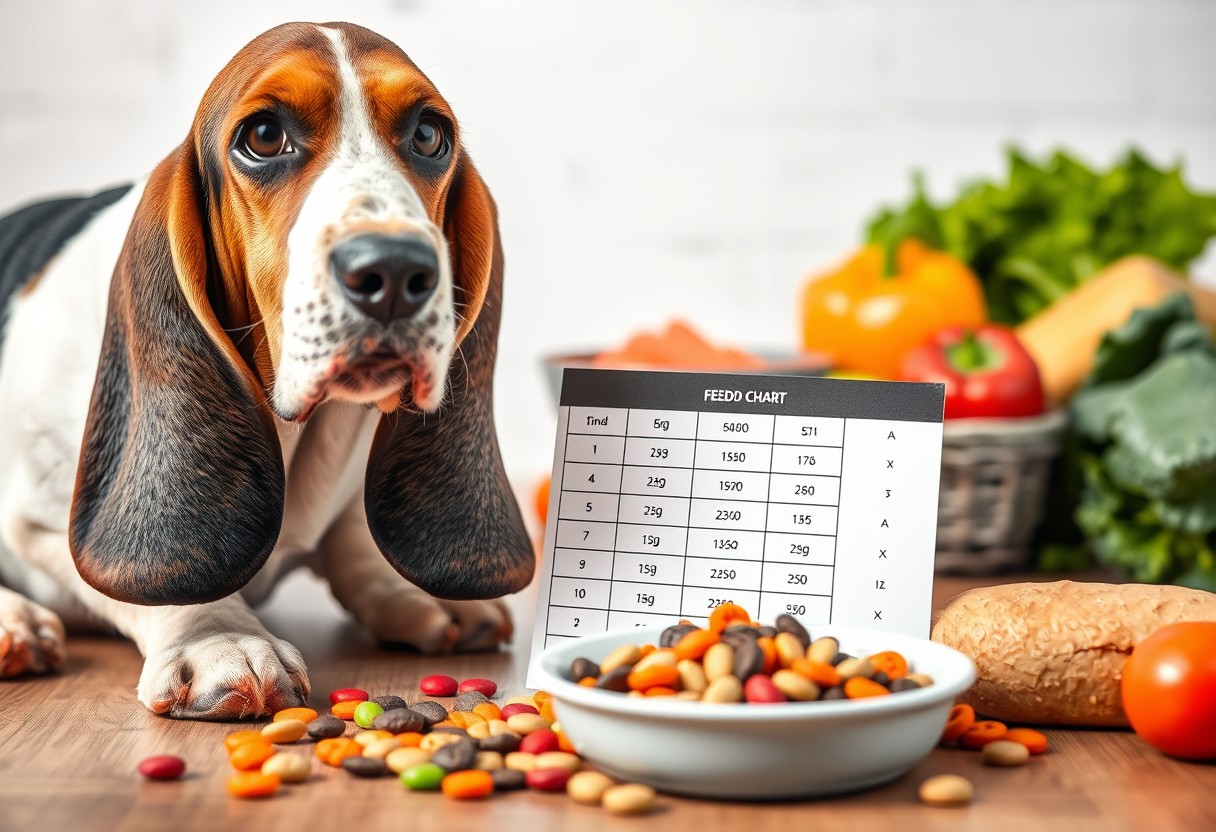
Homemade Diet Options
Not all dog foods satisfy the unique dietary requirements of your Basset Hound. Consider integrating homemade diet options into their meals. By preparing food at home, you can control the ingredients, ensuring your dog gets the proper nutrients without harmful additives. Always consult with a veterinarian to create a balanced meal plan tailored to your dog’s needs.
Recipes for Basset Hounds
One great recipe for your Basset Hound includes a mix of lean ground turkey, brown rice, carrots, and peas. This combination provides protein, carbohydrates, and vital vitamins, promoting overall health. Just ensure you gradually introduce new foods and adjust the portion sizes according to your dog’s weight and activity level.
Supplements and Vitamins
Hounds may require additional supplements and vitamins to ensure they meet their nutritional needs. A veterinary nutritionist can help you decide which nutritional supplements are necessary for your Basset Hound, especially if they have specific dietary restrictions. Common options include omega fatty acids for healthy skin and coat, glucosamine for joint support, and probiotics for digestive health. Recall, while supplements can be beneficial, it’s crucial not to over-supplement, as this may lead to adverse health effects.
Homemade meals can be beneficial, but they often lack all necessary nutrients. Incorporating high-quality supplements can help bridge this gap, ensuring that your Basset Hound receives everything it needs to thrive. Make sure you are cautious with human foods that are toxic to dogs, such as chocolate, grapes, and onions. Always prioritize a balanced diet and consult your veterinarian when adding any supplements to your dog’s regimen.
Monitoring Weight and Health
Once again, keeping a close eye on your Basset Hound’s weight is crucial for their overall health. Regular weigh-ins and maintaining a healthy body condition not only help prevent obesity but also reduce the risk of related health issues like joint problems and diabetes. By being proactive in monitoring their weight, you can ensure they live a happy, healthy life.
Ideal Weight Range for Basset Hounds
With a typical ideal weight range of 40 to 65 pounds, Basset Hounds require careful observation to ensure they stay within these limits. Depending on their age, activity level, and overall health, some may fall on the lower or higher end of this spectrum. Regular vet check-ups can provide you with personalized guidelines specific to your dog.
Signs of Overfeeding or Underfeeding
Weight fluctuations can signify overfeeding or underfeeding, both of which can impact your dog’s wellbeing. You should observe your Basset Hound closely for signs such as lethargy, excessive weight gain, or lack of appetite. A balanced diet and consistent portion sizes are crucial for maintaining optimal health, and any drastic changes in behavior or appearance should prompt a veterinary consultation.
The symptoms of overfeeding can include excess weight, leading to conditions such as obesity, which puts strain on their joints and overall health. Conversely, underfeeding can result in nutritional deficiencies and a lack of energy, making your Basset Hound more susceptible to illness. Always consult your veterinarian when you notice significant changes in appetite, and ensure your feeding routines align with your dog’s unique health needs for a better quality of life.
To wrap up
To wrap up, following a carefully designed Basset Hound feeding chart can significantly improve your dog’s health and well-being. By understanding your dog’s specific needs, choosing high-quality food, and considering factors like age and activity level, you ensure they receive the right nutrition. Incorporating the six nutritional tips we discussed will guide you in making informed choices for your Basset Hound’s diet. Keep in mind, a balanced diet plays a vital role in keeping your furry friend energetic and content, so be proactive in managing their nutritional intake.


